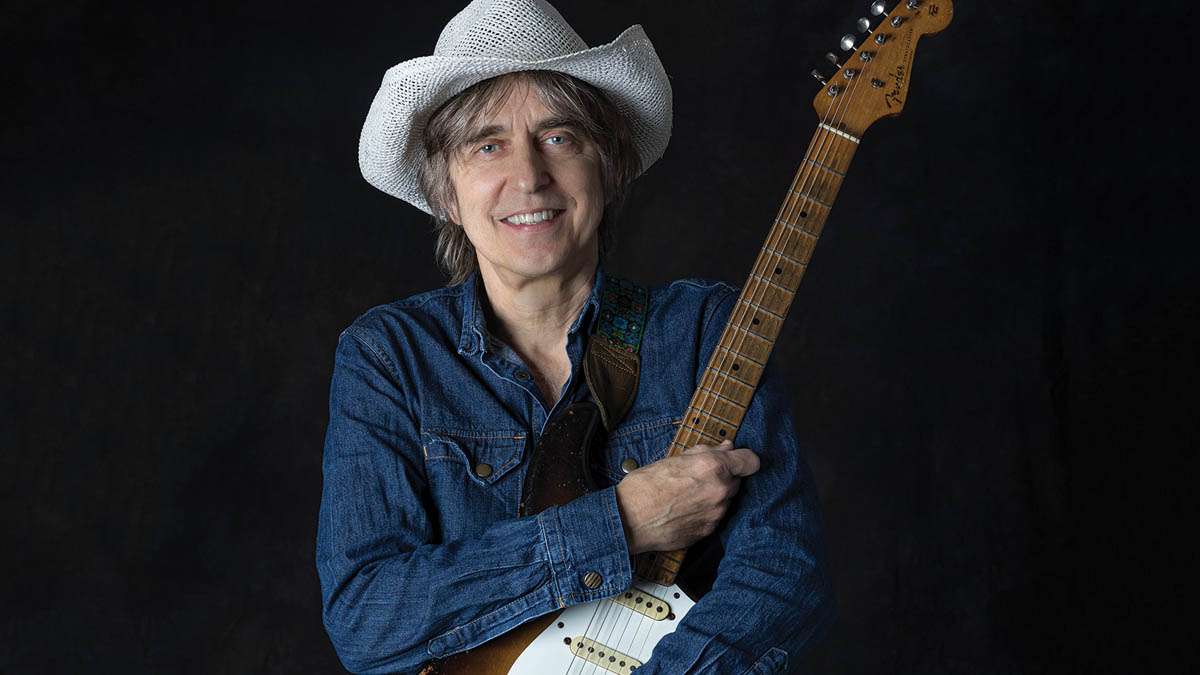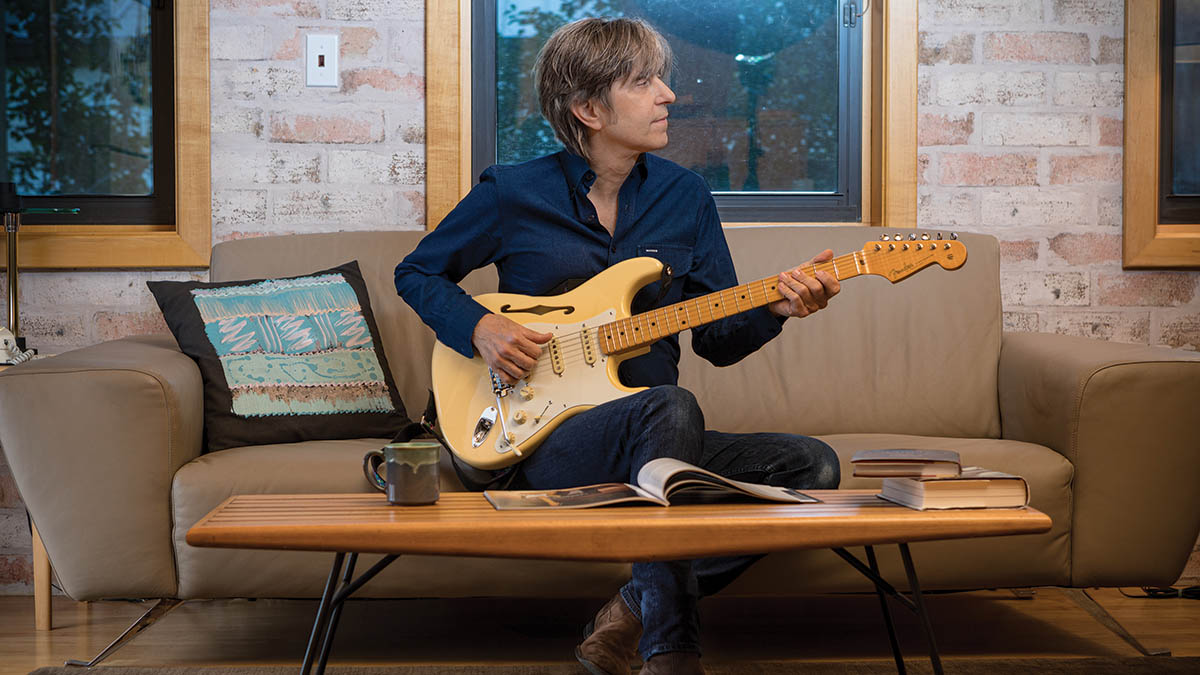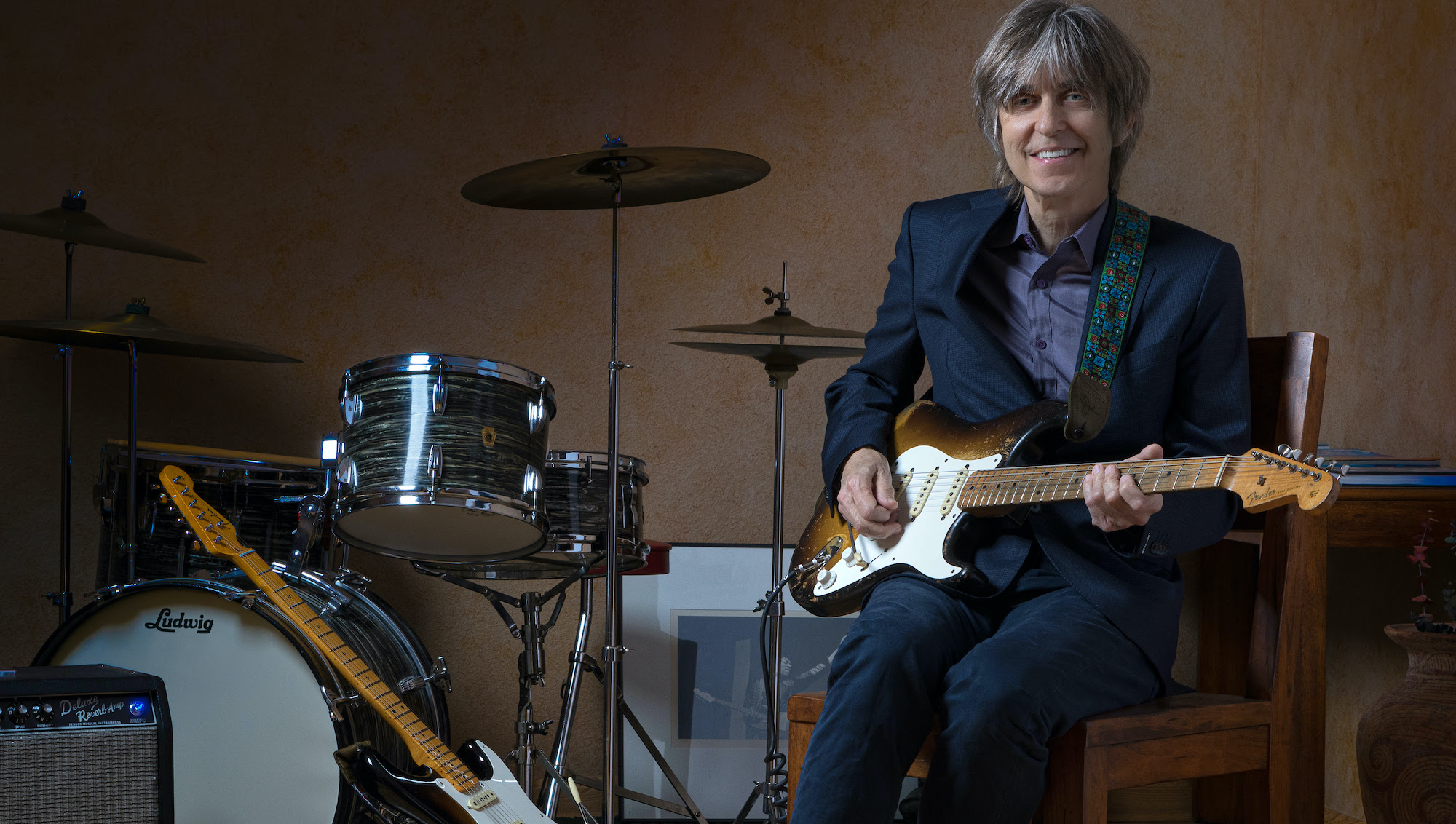
Eric Johnson isn’t known for flooding the market with product. Since he first began issuing studio recordings in 1986, his average span between albums is four years, and he’s been known to sometimes make fans wait five and even six years for a new disc.
“I know it might appear as if I’m taking my time,” he says, “but whenever I make an album, I usually record another one that I put aside.” He chuckles. “Looking at it that way, I’m really not that slow.”
During the remainder of 2022, Johnson devotees can revel in an abundance of riches, as the Grammy-winning Texas guitar star will issue not one, but two separate albums simultaneously – The Book of Making and Yesterday Meets Today – and he’s even offering a bonus disc of outtakes (inventively titled Takeouts) to fans who purchase both records together.
Interestingly, none of this was in Johnson’s plans whatsoever. “I hadn’t figured on either record, really, let alone both of them,” he says. He explains that the Covid lockdown period from 2020 and into 2021 offered him an unexpected opportunity to comb through his music files and assess the recordings he’d stashed away.
“I came up with 28 tracks, three of which were totally embarrassing, so I tossed them. Seven of them would go on Takeouts, so that left me with 18 songs. Some of them sounded really good right off the bat; other ones I needed to work on to bring them up to snuff.”
Originally, Johnson considered releasing all 18 tracks as a jam-packed single album, but he had trouble arranging the songs in a sequence he liked. Sequestering one batch of tunes on one album and a different group on another, however, seemed to solve the problem.
“Once I looked at them as two distinct records with their own themes, the songs seemed to work nicely together. It’s a lot of music, I know, but I’m really happy with all of it. It feels good to have cleared out the vaults and to get everything out there.”
All the latest guitar news, interviews, lessons, reviews, deals and more, direct to your inbox!
Johnson’s angelic and impassioned vocals are featured prominently throughout both records. On The Book of Making, there’s an array of captivating ballads such as Love Will Never Say Goodbye, My Faith in You and Bigger Than My Life, while Yesterday Meets Today offers tougher fare like the soulful title track and the ZZ Top-flavored rocker Move On Over.
As always, his prodigious guitar skills and that instantly recognizable signature sound are key elements of each cut. The feel-good instrumental Soundtrack Life is classic EJ stuff, brimming with bell-like arpeggios and sweeping leads that take flight and sail to the heavens.
Maha is another masterstroke, a two-minute jam that crams full-tilt blues, grungy riffing and even a little samba into one tight, two-minute package. And on Yesterday Meets Today’s dramatic closer, Until We Meet Again, he turns in an epic performance, alternating between haunting, reverb-drenched chords and an aching, understated lead that hits an emotional bullseye.
“There’s some cool rock stuff and a lot of nice jams that turned into songs,” Johnson says, “but for the most part, I wanted to concentrate on the heartfelt stuff. I just wanted to make music that people could listen to over and over, so I wasn’t concerned with having this balance of guitar stuff.
“Being at home, I had a chance to reflect, and that leads to feelings of gratitude for what you have. I think a lot of people have been going through something similar recently.”
You’ve talked a lot about your guitar influences, but who’s inspired you as a singer? There are a lot of vocal tunes on these records.
“Oh, well, Stevie Wonder, for sure. Those records he made in the ’70s are so iconic. He always sang beautifully, but he never went beyond or above serving the song. I wish I could sing like him. When I’m dreaming, I do – why, the other night I had this great dream in which I was singing really good. I woke up and thought, ‘If only I could sing like that in real life.’ Stevie’s my favorite, but I also love Paul Rodgers.”
The other night I had this great dream in which I was singing really good. I woke up and thought, ‘If only I could sing like that in real life’
As a lyricist, do you draw inspiration from anybody in particular?
“Again, there’s Stevie Wonder. He’s so heartfelt and pure. Then there’s Joni Mitchell and, of course, Bob Dylan. Those are three who come to mind. I mean, I don’t come close to doing what they do, but they do inspire me.”
Does lyric writing come to you as easily as guitar playing?
“No, not really. I can be really slow sometimes, but that’s when I try to force it. If I’m able to just hang back and get out of the way, it happens quite easily. A lot of times, I write scratch lyrics just to see where it’s all going. You develop a base for what you want to say, and then you zero in on the message and refine it. It’s a process, just like guitar playing.”

Let’s talk about your guitar playing on these records. Soundtrack Life epitomizes your sound and approach to soloing perhaps as much as Cliffs of Dover.
“Sure, sure. It’s ‘classic me’. I think it’s just a process that you refine over the years. You learn from all your heroes. If you have varied heroes from different styles, you take a little bit of this, a little bit of that, and then you build this recipe with a lot of ingredients. That’s what I did, and I guess I wound up with something that’s different and, I guess, probably a little unique.
“So yeah, that song is a good representation. It’s a basic three-piece with me playing lead and rhythm live. Wayne Salzmann played drums and Chris Maresh played bass, and they both did excellent jobs. I kept some of my original tracks and then redid certain sections to offer different textures. I didn’t like some of the lead stuff – I wanted to play it better. I redid the lead and added extra solo stuff.”
We were just making it up as we went along. Quite a few things on the album happened that way
To paraphrase Mountain, A Thousand Miles sounds like the soundtrack to an imaginary western – it conjures desert vistas. There is a little bit of scat singing in there too, but it’s mostly a guitar instrumental.
“Yeah, that was just a jam in the rehearsal hall with [drummer] Tommy [Taylor] and [bassist] Kyle [Brock]. Once I recorded it, I went back and added a bunch of stuff and had a lot of fun with it. We were just making it up as we went along. Quite a few things on the album happened that way.”
Move On Over has a distinct ZZ Top grind to it. Am I in the right lane?
“Sure, I’ll take that. I think that sounds about right. I love Billy Gibbons’ use of his blues-rock thing. He’s such a great player, and what tone, you know? That might have been in my head a bit. I’m still amazed when I hear those records he made. He’s a one-of-a-kind guy.”
You play a beautiful flanged solo in the song.
“Thanks, but to be honest, that was something [engineer] Richard Mullen put on the track when he was mixing it. That song was mixed years ago; I didn’t do anything new to it. It was just sitting there, so I put it out. It was from that side project I did, Alien Love Child.”
The song Maha… what does the title mean?
“I think it was just me kind of referencing Mahavishnu Orchestra. But as I started finishing the song, it became a little more Spanish flavor than just fusion Mahavishnu, I guess.”
It’s two minutes long, but come on – there’s so many musical styles going on there.
“Yeah, yeah. It was kind of a short jam. It went on, but I edited it down a little bit, just to be a little more concise. It probably could have been longer, but I like it the way it is. And I added some acoustic. It’s got the rock electric vibe and everything else.”
A lot of the instrumentals were born out of jams.
“Oh, for sure. Most of them are.”
Dorsey Takes a Day Off – are we talking about Tommy Dorsey?
“[Laughs] I don’t know why I named it that, because I don’t know anybody named Dorsey. And it’s not Tommy Dorsey. It was just a completely silly name that came out of nowhere. That was another total jam. I was hamming around with [drummer] Tom Brechtlein, and that’s what happened.”
You faded it way too soon. I was like, “Man, this song is going to some cool places,” and then it started to fade.
“Yeah, I guess. Truth is, we didn’t know what we were doing, and it started getting a little goosey toward the end. [Laughs] I just faded the song out before it got completely silly.”

Until We Meet Again is a heartbreaking instrumental. Do you have to put yourself in a proper mental state to do a song like that?
“I do. That song wasn’t a jam, as you can tell, I hope, but it did start out as kind of a clean guitar improv, kind of like what I do live before Cliffs of Dover. I recorded myself doing an improvisational thing, but afterward I went back and listened, and then I mapped out the chord changes that I was doing. There’s a definite structure to it. I started adding to it and created an orchestral vibe to it as it unfolded. I think it came out really nice.”
Seeing as these albums were several years in the making, no doubt you used a bunch of guitars.
“Not a bunch, but a few. On It’s Just the Rain, I used a stereo Gibson ES-345 that belonged to a friend of mine. Other than that, I play these nylon-string guitars – Godins. They have built-in synthesizer stuff, and they’re really cool. Most of the guitars are Strats and Les Pauls. I used my new ‘Virginia’ Strat that I did with Fender. And on Move On Over, I think I played a 335.”

What are your touring plans, and have you decided how to work the new music into your set?
“I think the first touring I’ll do will be in February of next year. I’ll probably pick a few things off the albums and work them in with the older stuff that people like to hear. I’m working on some acoustic songs now, so I’d like to see if they can be part of the set. Actually, I’m doing an acoustic show pretty soon just to get back into it. Maybe I’ll do a few acoustic shows – we’ll see.”
It’s been a while since you’ve played live. Are you excited to play for people again?
“I am. It’s been a few years, which is kind of crazy. I gotta get used to the idea of going out; I imagine it’ll feel a little foreign to me after being off the stage for a few years. I hope people come out. That’d be nice.”
- Yesterday Meets Today and The Book of Making are out now via Blue Elan.
Joe is a freelance journalist who has, over the past few decades, interviewed hundreds of guitarists for Guitar World, Guitar Player, MusicRadar and Classic Rock. He is also a former editor of Guitar World, contributing writer for Guitar Aficionado and VP of A&R for Island Records. He’s an enthusiastic guitarist, but he’s nowhere near the likes of the people he interviews. Surprisingly, his skills are more suited to the drums. If you need a drummer for your Beatles tribute band, look him up.

